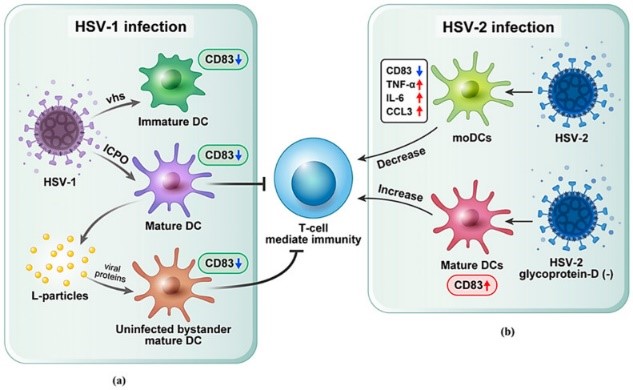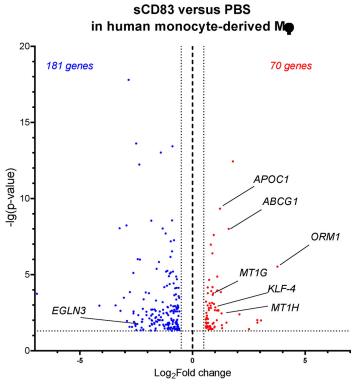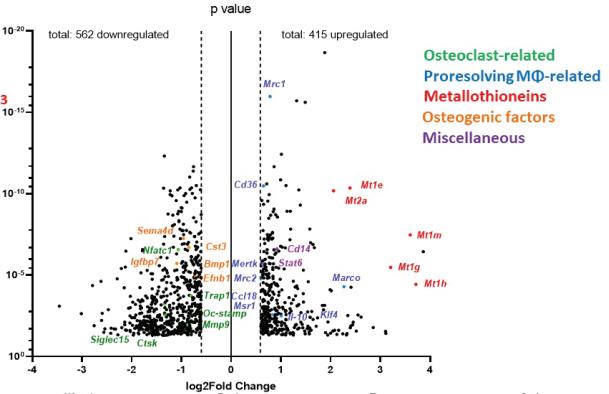CD83
-
Official Full Name
CD83 antigen -
Overview
CD83 is a 43 kD single chain type I glycoprotein also known as HB15. A member of the immunoglobulin superfamily, CD83 is expressed on a subset of dendritic cells, Langerhans cells, and weakly on activated lymphocytes. Although CD83 is thought to play a ro -
Synonyms
CD83;CD83 antigen;mCD83;MGC130312;MGC130313
Recombinant Proteins
- Human
- Mouse
- Cynomolgus
- Cynomolgus/Rhesus
- Rat
- Rhesus macaque
- HEK293
- CHO
- Sf21 Cells
- C-His
- Wheat Germ
- E.coli
- Human Cells
- Mouse
- In Vitro Cell Free System
- Fc
- His
- Non
- GST
- DDK
- Myc
- rFc
- Avi
Background
What is CD83 protein?
CD83 gene (CD83 molecule) is a protein coding gene which situated on the short arm of chromosome 6 at locus 6p23. CD83 protein is a member of the immunoglobulin superfamily, primarily recognized as an activation marker for antigen-presenting cells, such as dendritic cells. It is expressed in both membrane-bound and soluble forms and plays a crucial role in immune regulation. The soluble form of CD83 (sCD83) has been found to possess immune suppressive functions and is elevated in the serum of patients with certain autoimmune diseases and hematological malignancies. CD83 is also implicated in the modulation of cellular activation status in various immune cells, including microglia, and has been identified as a marker for specific T cell states, such as precursor exhausted T cells. Due to its significant role in immune responses, CD83 holds therapeutic potential in conditions like autoimmune diseases, transplantation, and possibly cancer. The CD83 protein is consisted of 205 amino acids and CD83 molecular weight is approximately 23.0 kDa.
What is the function of CD83 protein?
CD83 protein is a member of the immunoglobulin superfamily and is mainly expressed as an activation marker of antigen-presenting cells, especially in mature dendritic cells (DCs). It plays a role in activation, maturation and homeostasis regulation of immune cells. CD83 proteins come in two forms: membrane bound (mCD83) and soluble (sCD83). mCD83 is primarily detected on activated immune cells, while sCD83 is elevated in serum in patients with autoimmune diseases and certain blood tumors and has been reported to have immunosuppressive functions. In addition, CD83 plays a key role in controlling and resolving immune responses and is essential for the differentiation, development and maintenance of T and B lymphocytes.

Fig1. Correlation between CD83 and HSV. (Bushra Riaz, 2023)
CD83 Related Signaling Pathway
As a marker of mature dendritic cells, CD83 is involved in regulating the maturation process of dendritic cells. CD83 is not a typical co-stimulatory molecule, but rather plays a key role in controlling and resolving immune responses. CD83 plays an important role in T and B lymphocyte differentiation, development and maintenance of tolerance. Soluble CD83 (sCD83) is elevated in serum and immunosuppressive in patients with autoimmune diseases and certain hematological malignancies. By binding to ligands on monocytes and dendritic cells, sCD83 can promote the generation of T-regulatory cells, inhibit the activation of dendritic cells, and reduce the activation of T cells, thus playing an immunosuppressive effect in allotransplantation and inflammation.
CD83 Related Diseases
The CD83 protein has been implicated in a variety of diseases, including autoimmune diseases such as systemic lupus erythematosus (SLE), and inflammation-related diseases such as chronic hepatitis B and ulcerative colitis. CD83 also plays a role in graft-versus-host disease (GVHD), a complication associated with organ or hematopoietic stem cell transplantation. In the field of oncology, the expression of CD83 is associated with certain types of cancer, such as acute myeloid leukemia. Due to its important role in immune regulation, CD83 has potential applications in the treatment of the above-mentioned diseases, especially in immunotherapy and transplantation medicine.
Bioapplications of CD83
CD83 protein has a variety of potential applications due to its important role in immune regulation. In terms of clinical treatment, CD83 or its derivatives can be used as immunomodulators for the treatment of autoimmune and inflammatory diseases. In addition, because of its key role in dendritic cell maturation, CD83 also plays a role in vaccine development, particularly in cancer vaccines designed to activate specific immune responses. In transplantation medicine, the regulation of CD83 may help reduce rejection and improve transplant success. In the field of drug development, CD83-related drugs or antibodies may become new treatments. Finally, because CD83 expression levels vary in a variety of diseases, it can also be used as a biomarker for disease diagnosis and monitoring.
Case Study
Case Study 1: Katrin Peckert-Maier, 2023
Alterations in macrophage (Mφ) polarization, function, and metabolic signature can foster development of chronic diseases, such as autoimmunity or fibrotic tissue remodeling. Thus, identification of novel therapeutic agents that modulate human Mφ biology is crucial for treatment of such conditions. Herein, researchers demonstrate that the soluble CD83 (sCD83) protein induces pro-resolving features in human monocyte-derived Mφ biology. They show that sCD83 strikingly increases the expression of inhibitory molecules including ILT-2 (immunoglobulin-like transcript 2), ILT-4, ILT-5, and CD163, whereas activation markers, such as MHC-II and MSR-1, were significantly downregulated. This goes along with a decreased capacity to stimulate alloreactive T cells in mixed lymphocyte reaction (MLR) assays. Bulk RNA sequencing and pathway analyses revealed that sCD83 downregulates pathways associated with pro-inflammatory. By using the LXR pathway antagonist GSK2033, we show that transcription of specific genes (e.g., PPARG, ABCA1, ABCG1, CD36) induced by sCD83 is dependent on LXR activation.

Fig1. sCD83 has no influence on differentiation efficacy of human monocyte-derived Mφ.

Fig2. Volcano plot of RNA sequencing analyses of human monocyte-derived Mφ differentiated in the presence of sCD83 versus mock-treated Mφ.
Case Study 2: Dmytro Royzman, 2022
Here researchers show that soluble CD83 induces the resolution of inflammation in an antigen-induced arthritis (AIA) model. Joint swelling and the arthritis-related expression levels of IL-1β, IL-6, RANKL, MMP9, and OC-Stamp were strongly reduced, while Foxp3 was induced. In addition, researchers observed a significant inhibition of TRAP+ osteoclast formation, correlating with the reduced arthritic disease score. In contrast, cell-specific deletion of CD83 in human and murine precursor cells resulted in an enhanced formation of mature osteoclasts. RNA sequencing analyses, comparing sCD83- with mock treated cells, revealed a strong downregulation of osteoclastogenic factors, such as Oc-Stamp, Mmp9 and Nfatc1, Ctsk, and Trap. Concomitantly, transcripts typical for pro-resolving macrophages, e.g., Mrc1/2, Marco, Klf4, and Mertk, were upregulated. Interestingly, members of the metallothionein (MT) family, which have been associated with a reduced arthritic disease severity, were also highly induced by sCD83 in samples derived from RA patients. Finally, we elucidated the sCD83-induced signaling cascade downstream to its binding to the Toll-like receptor 4/(TLR4/MD2) receptor complex using CRISPR/Cas9-induced knockdowns of TLR4/MyD88/TRIF and MTs, revealing that sCD83 acts via the TRIF-signaling cascade.

Fig3. Membrane-bound CD83 expression protects from excessive osteoclastogenesis in mice.

Fig4. Volcano plot of RNA sequencing analyses of sCD83- vs. PBS-treated osteoclasts from healthy donors.
Quality Guarantee
High Purity
.jpg)
Fig1. SDS-PAGE (CD83-3927H)
.
.jpg)
Fig2. SDS-PAGE (CD83-0869H)
Involved Pathway
CD83 involved in several pathways and played different roles in them. We selected most pathways CD83 participated on our site, such as TCR Signaling Pathway, which may be useful for your reference. Also, other proteins which involved in the same pathway with CD83 were listed below. Creative BioMart supplied nearly all the proteins listed, you can search them on our site.
| Pathway Name | Pathway Related Protein |
|---|---|
| TCR Signaling Pathway | DBNL |
Protein Function
CD83 has several biochemical functions, for example, . Some of the functions are cooperated with other proteins, some of the functions could acted by CD83 itself. We selected most functions CD83 had, and list some proteins which have the same functions with CD83. You can find most of the proteins on our site.
| Function | Related Protein |
|---|
Interacting Protein
CD83 has direct interactions with proteins and molecules. Those interactions were detected by several methods such as yeast two hybrid, co-IP, pull-down and so on. We selected proteins and molecules interacted with CD83 here. Most of them are supplied by our site. Hope this information will be useful for your research of CD83.
EIF4E;q7ara8_yerpe
Resources
Research Area
Related Services
Related Products
References
- Tomescu, C; Seaton, KE; et al. Innate Activation of MDC and NK Cells in High-Risk HIV-1-Exposed Seronegative IV-Drug Users Who Share Needles When Compared With Low-Risk Nonsharing IV-Drug User Controls. JAIDS-JOURNAL OF ACQUIRED IMMUNE DEFICIENCY SYNDROMES 68:264-273(2015).
- McHeyzer-Williams, LJ; Milpied, PJ; et al. Class-switched memory B cells remodel BCRs within secondary germinal centers. NATURE IMMUNOLOGY 16:296-U129(2015).



